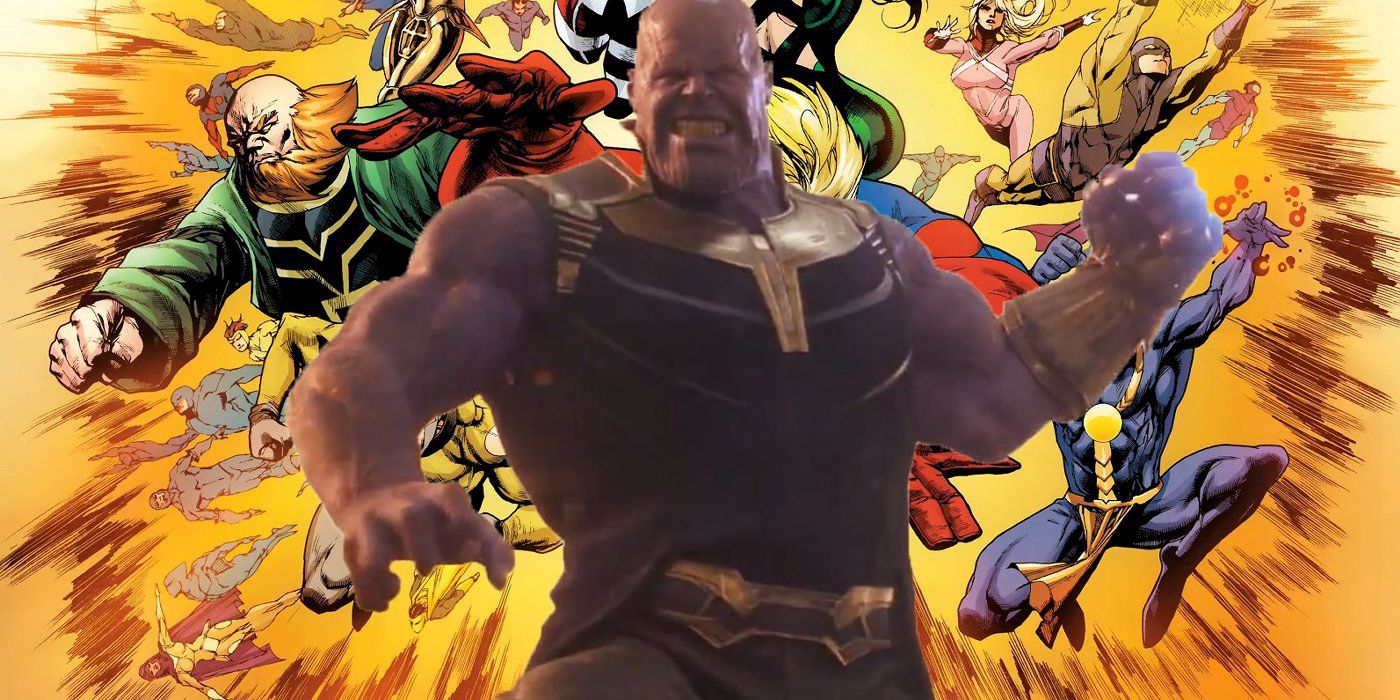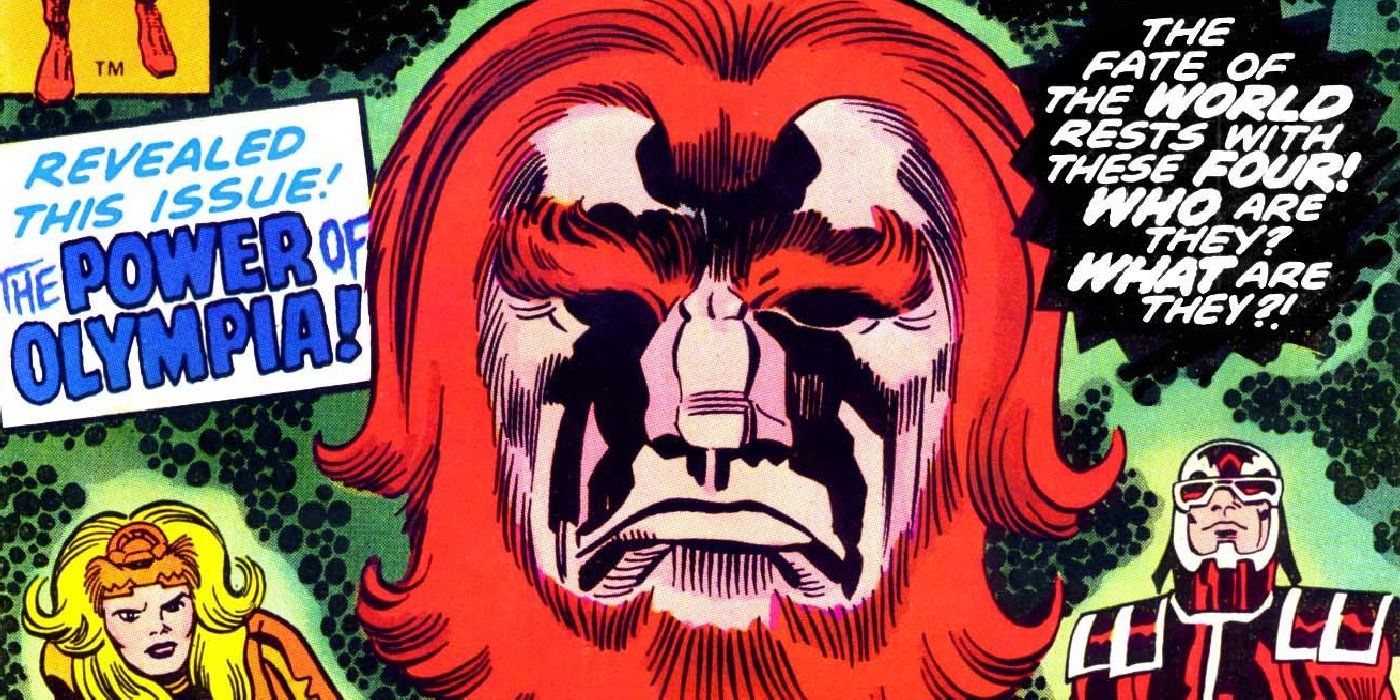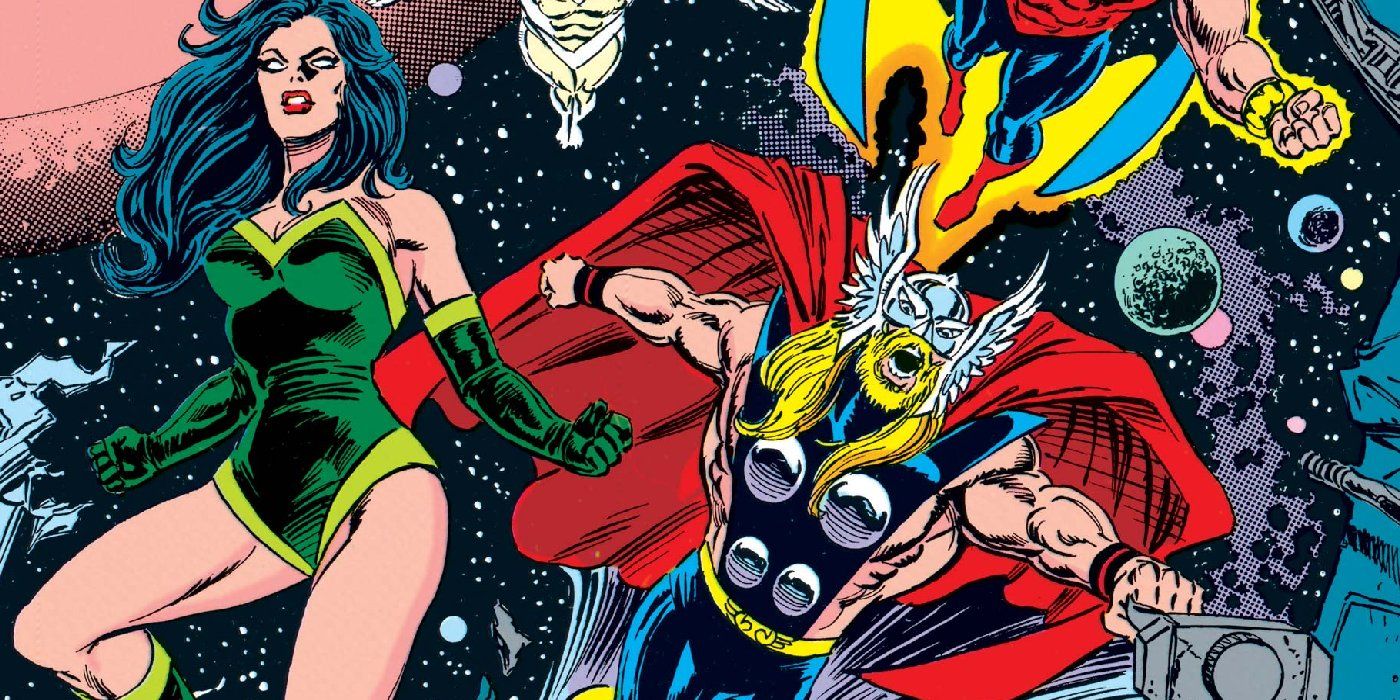
The Eternals could have been a big help in Avengers: Infinity War and Avengers: Endgame if they had showed up to fight Thanos (Josh Brolin), so where were they when the Earth needed them most? The answer to this question will likely be revealed when the ancient race of immortal aliens make their MCU debut in Marvel's second Phase 4 movie, Eternals.
With the rallying cry of "Avengers, assemble," Captain America (Chris Evans) famously led an army of superheroes into battle against Thanos and his underlings, and despite their numbers, they were nearly defeated by the Mad Titan. Even without the Infinity Stones, Thanos was a force to be reckoned with, but in the end, Thanos was killed when Iron Man (Robert Downey, Jr.) used his makeshift Infinity Gauntlet to erase Thanos and his forces from existence. Things almost went wrong for the Avengers, and the fight with Thanos (as well as the one that they lost in Infinity War) could have gone quite differently if the Eternals had gotten involved.
In the comic books, the Eternals are among the most powerful heroes in the Marvel Universe, and several of them will be brought to life on the big screen in Phase 4 of the Marvel Cinematic Universe. Directed by Chloe Zhao and featuring a cast packed with big-name actors, Eternals will introduce audiences to Ikaris (Richard Madden), Thena (Angeline Jolie), Sersi (Gemma Chan), and more, in a story that will span over a thousand years and explore the history of the MCU. The movie may also explain why these characters have waited so long to show themselves. The Eternals may have a good reason for staying out of the conflicts in Avengers: Infinity War and Avengers: Endgame. Here's why they may not have been on-hand for the battle with Thanos.

In Marvel Comics, cosmic beings known as the Celestials experimented with the DNA of humans to create two genetic offshoots: the super-powered Eternals and the monstrous Deviants. The Eternals, whose abilities caused them to be viewed as gods, lived apart from the humans. It was the will of their creators that they avoid interfering in the affairs of humans until the Celestials returned to pass judgment on the planet. So as a result, Zuras - the Eternals' leader - made sure that his people respected this rule. The Celestials' decree made sense because the Eternals not getting involved allowed the Celestials, who have studied humans and other species like scientists, to observe the natural progression of the evolution of human culture.
Gilgamesh serves as a prime example of how serious the Eternals treat the rules imposed on them by the Celestials. Zuras didn't necessarily forbid all contact with humans, as Eternals like Sersi were allowed to live among them, but Gilgamesh apparently took things too far. He used his powers to become a hero to the humans. His actions earned the wrath of Zuras, who promptly banished Gilgamesh. Even mentioning his name became a taboo, so Gilgamesh became known as "The Forgotten One."

Does the Eternals' non-interference rule apply to their MCU counterparts? Like the comic characters, the MCU's Eternals were created by the Celestials, so it is possible that the MCU's Eternals also don't interfere in human affairs. In fact, it may be the most sensible explanation. The alien Eternals have secretly shared the Earth with humans for thousands of years, and the Earth has been threatened on numerous occasions, particularly since the Chitauri invasion of New York in The Avengers. There has to be a reason why the Eternals have been nothing more than spectators all this time, and not being allowed to take action would be a logical explanation. If the Eternals were told to let humanity run its course, it would make sense that the Eternals have remained on the sidelines for so long. That could be why the Eternals did nothing when Thanos attacked. The Eternals were likely aware of the danger, but didn't want to risk angering either their own leader (Salma Hayek's Ajak) or the Celestials.
Since the movie is expected to include scenes from the MCU's ancient past, Eternals may dive in to other situations where the Eternals struggled with this rule, or it could show audiences why this rule was made in the first place. It could be that their experiences in Babylon or some other ancient location may have taught the Eternals that interfering can sometimes make things worse.

If the Eternals do have a non-interference rule, that may change in Phase 4. For the Eternals to ignore alien invasions, the deaths of half of everyone and the universe, but to rise up and start fighting in Eternals suggests that something even worse must be on the horizon. The official synopsis for Eternals reveals that this incident relates to the Deviants. Whatever the Deviants are up to could somehow be a greater threat to the world than even Thanos, especially if their activities force the Eternals into action.
Another possible explanation for the sudden change could stem from the comics. The comic book version of the Eternals were expected to respect the Celestials' rules about non-interference until it was time for their return to Earth. Once the Celestials came back, the Eternals - knowing the fate of the whole planet was at stake - cast aside the rules and decided to work alongside the humans and the Deviants to make sure all their civilizations persevered. That's why Eternals like Sersi were able to become Avengers in the early 1990s. At that point, the Eternals had already revealed themselves, so staying hidden was no longer a priority. A similar situation could play out in Eternals, which could set the stage for many of them to take more active roles in future MCU movies.
from ScreenRant - Feed https://ift.tt/39rz57W


0 Comments